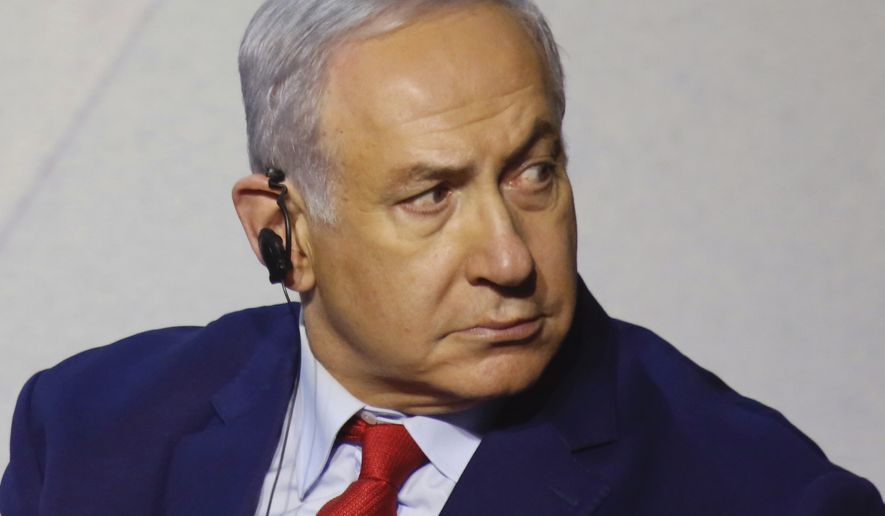Israel moved quickly Thursday to fill the coming power vacuum after President Trump said U.S. troops were being withdrawn from Syria, vowing to ramp up its own military campaign against Iranian-backed proxy groups in the country — a clear sign that the war between Jerusalem and Tehran will continue with or without U.S. involvement.
“We will continue to act very aggressively against Iran’s efforts to entrench in Syria,” Israeli Prime Minister Benjamin Netanyahu said in a televised speech Thursday. “We do not intend to reduce our efforts. We will intensify them, and I know that we do so with the full support and backing of the United States.”
Mr. Netanyahu made the comments amid a backlash in the U.S. from lawmakers of both parties who say Mr. Trump is putting Israel, its strongest ally in the region, in grave danger of increased exposure to Hezbollah and other extremist groups allied with Iran and Syrian President Bashar Assad. The ramifications for Israel were just one of aspect of the global fallout from Mr. Trump’s stunning declaration Wednesday morning that he believes the war on the Islamic State in Syria has been won and that it’s time for American forces to come home.
The Pentagon offered little detail on the looming withdrawal, how soon it will be implemented and exactly what the American-led mission to defeat the Islamic State will look like once the roughly 2,000 U.S. troops exit Syria.
Secretary of State Mike Pompeo disputed reports that the president’s announcement blindsided his military and foreign policy advisers. He said Mr. Trump acted in full consultation with his national security team. Echoing Pentagon officials, Mr. Pompeo also said that leaving Syria does not mean the Trump administration is ending its war on the Islamic State, which is estimated to have as many as 30,000 fighters across the Middle East and Africa.
“This was a decision that was made with lots of consultation between all the senior-level officials, including myself, with the president,” Mr. Pompeo told conservative commentator Laura Ingraham on Thursday.
Mr. Trump offered something of a shifting rationale Thursday for the withdrawal. His initial explanation — that the Islamic State has been defeated in Syria and there is no longer a reason for the U.S. to be there — gave way to a larger argument that the U.S. cannot police the world or be solely responsible for defeating the terrorist organization.
“Getting out of Syria was no surprise,” he tweeted Thursday morning. “I’ve been campaigning on it for years, and six months ago, when I very publicly wanted to do it, I agreed to stay longer. Russia, Iran, Syria and others are the local enemy of ISIS. We were doing [their] work.
“Does the USA want to be the Policeman of the Middle East, getting NOTHING but spending precious lives and trillions of dollars protecting others who, in almost all cases, do not appreciate what we are doing?” he continued. “Do we want to be there forever?”
Whatever the reasoning, Mr. Trump is facing aftershocks across Europe and the Middle East and near-universal outrage from Congress.
French and British officials argued that the Islamic State remains a serious threat to the region and that the U.S. must not lose sight of the dangers.
Without direct U.S. military backing, America’s Kurdish allies said Thursday, they are considering releasing as many as 3,200 Islamic State prisoners as they prepare for continued clashes with the terrorist group and for the possibility of military attacks from Turkey.
The Syrian Kurdish forces, critics said, have been valuable allies in a yearslong fight with the Islamic State but now are being abruptly abandoned.
“If we do this to the Kurds, who is going to help us in the future?” Sen. Lindsey Graham, South Carolina Republican, said on CNN.
Other lawmakers zeroed in on the threat to Israel, which has entered the fight as Iranian advisers and Tehran-backed Hezbollah battle Syrian rebel groups in the strategically vital Golan Heights area and along the Israeli-Syrian border.
“The war against ISIS is not won,” Sen. Christopher A. Coons, Delaware Democrat, told MSNBC.
In Israel, officials made it no secret that they believe Mr. Trump’s decision puts their country in greater danger.
“Of course the American decision is not good for us,” Israeli Finance Minister Moshe Kahlon told Israel’s Army Radio. “But we know that safeguarding Israel’s security is also an American interest in the region.”
• Ben Wolfgang can be reached at bwolfgang@washingtontimes.com.




Please read our comment policy before commenting.